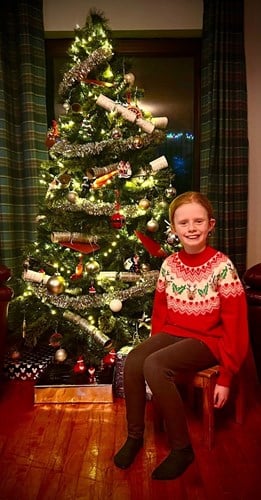The craziness of Christmas
Published Date: 22 Dec 2022
I don’t think there’s anything our family loves more than Christmas – time with family and friends, special foods and being cosy together on cold, winter nights. We also love the madness, but for Charlotte we do make a few adaptations.
Auditory memory for deaf children can be difficult. We have learnt over the years that it’s better to chat things through in advance, check understanding of words, learn people’s names and talk about what might happen at events we’re going to. For example, this year we will spend time with my aunts, uncles and cousins on Christmas morning. These are family members that Charlotte rarely meets, so we give them a few tips about being deaf aware, such as saying Charlotte’s name before speaking, keeping eye contact during a conversation and not talking with food in their mouths. We also prepare Charlotte (and include her brothers) before we go, talking about everyone’s name, who is related to whom and what they might talk to her about.
Background noise is usually worse at Christmas with lots of excitement and often background music. Not only can the music be distracting, but often Charlotte wants to listen to it and so she stops listening to the conversation. We try to have times for music and times without – we have kitchen discos and time for singing and signing along to the songs, then we turn it off when playing games or having dinner to allow concentration on conversation.
Excitement can be exhausting, so we also plan in quiet times, like watching a movie, reading books or doing word searches. This allows Charlotte to recover from all the noise. When at home or out with us, she can also choose to remove her cochlear implants for some quietness, and then we will rely on sign language for communication. Letting her choose has always been something we’ve advocated, and she definitely makes her deafness/hearing suit her.
Finally, we try to keep up to date with the toys and subjects Charlotte and her friends might like or talk about. This enables us to use that vocabulary at home, introducing it naturally and letting Charlotte ask questions, but also testing that she knows the meaning of what she’s saying (without making it seem like a test). This means she doesn’t get embarrassed when chatting and has the opportunity to request the ‘in toys’ if that’s what she wants to do. Charlotte’s classroom assistant is a good help with this one as she’s with the girls every day and knows their likes and dislikes.
We want Christmas to work for the whole family, and these adaptations help us do that. A little bit of planning can help a lot.
